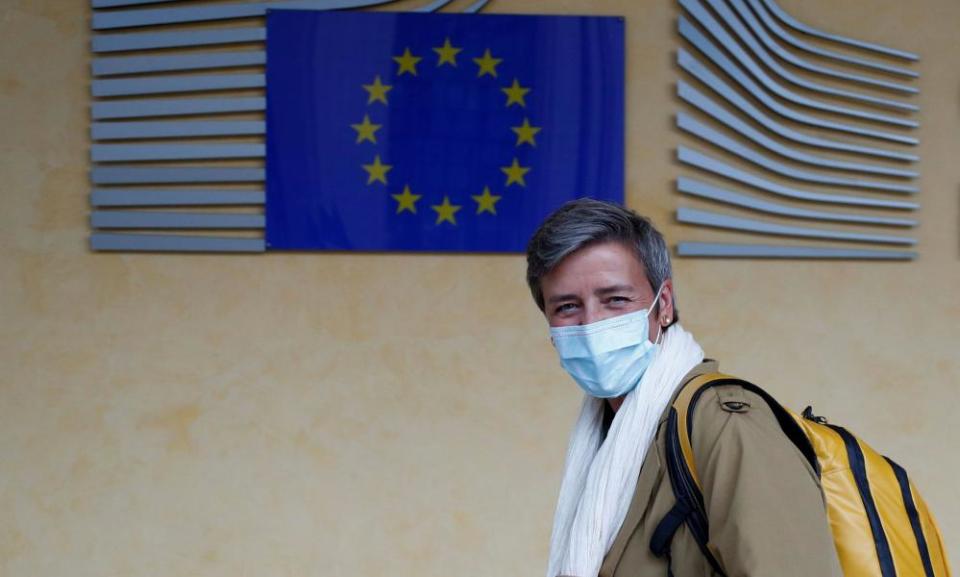Margrethe Vestager was 100% correct over public mood on Apple tax case

Margrethe Vestager may as well give up. If the EU’s competition commissioner can’t win her highest-profile case in the EU’s second-highest court, then the EU’s tax arrangements, as they apply to multinational tech companies, will remain a free-for-all.
In practice, she may plough on. The Luxembourg-based general court’s order that Apple does not need to pay €13bn (£11.7bn) in back taxes to the Irish government can be challenged. Lawyers may yet enjoy many more years of lucrative work.
Wednesday’s defeat for Brussels, though, is a reminder of the glacial pace at which international tax reform proceeds. Vestager’s original ruling was made in 2016 and referenced “sweetheart” arrangements between Apple and Ireland’s revenue authority going as far back as 1991. The company was said to be paying tax in Ireland at a rate of under 1% for two decades – just 0.005% in one year.
Vestager’s innovation, it seemed, was to regard aggressive tax planning, when blessed by EU members, as a form of illegal state aid. If that principle can’t stand up in court, the commission could be looking at multiple losses. Indeed, it has already lost another case involving Starbucks and the Netherlands.
The superficially baffling aspect of the Apple case was that Ireland was on the company’s side; Dublin didn’t want to receive €13bn in back taxes. But, actually, the stance was understandable. After Apple, the next step could have been a challenge to Ireland’s 12.5% corporate tax rate, the main lure for US tech and pharmaceutical companies looking for an EU base. That threat would now seem to have evaporated.
So good luck to the OECD in trying to hammer out a common approach to taxing global digital companies, which is supposed to be the next big adventure. If Brussels and EU member states are still fighting battles from the last decade, the US may conclude it can give the whole thing a miss.
But two points should still be obvious. First, global tech companies are undertaxed. Second, there is intense public anger at the use of complex tax arrangements. That is what encouraged Vestager to extend her competition brief into tax territory in the first place. Whatever the merits of her legal case, her reading of the public mood was 100% correct.
Ethical fund managers didn’t seem shocked when share price was rising
Boohoo’s shares are still falling – they’ve almost halved in a fortnight – and one can understand why. The questions keep coming.
Philip Dunne, chair of the parliamentary environmental audit committee (EAC), wants answers to six detailed inquiries, ranging from the demands Boohoo put on its suppliers in Leicester during the pandemic to why a pledge to join the clothing industry’s ethical trading initiative has not been honoured.
The EAC’s involvement is yet another reminder that allegations of pay abuses and poor working conditions in Leicester’s textile industry are not new. The committee took evidence from leading retailers, including Boohoo co-founder Carol Kane, in 2018 and published a blistering report in 2019 called Fixing Fashion. All the concerns were on full display.
The government rejected the report’s recommendations, so Dunne could usefully write another letter to ministers asking why. In the meantime, be amazed at those “ethical” fund managers who are dumping their shares in Boohoo, seemingly shocked by what they’re now hearing about Leicester.
Come on, you had your chance to be shocked more than a year ago. The difference, then, one might suggest, was that Boohoo’s share price was rising.
Sunak needs to keep open mind during early stage of recovery
“I’m not sure it is sensible for the government to have individual equity stakes in hundreds of thousands of businesses,” Rishi Sunak, the chancellor, told the Treasury select committee on Wednesday.
One can understand his reticence. A vast portfolio of stakes in companies of many different sizes would be extremely fiddly. But Sunak also needs to face facts: he has underwritten billions upon billions of loans to companies, and can’t simply let defaults rip if there are better alternatives.
The Treasury itself obviously wouldn’t have the capacity to conduct thousands of debt-for-equity restructuring negotiations. But it can create an agency to do the job, and it could invite private capital to participate. We are at the early stage of the recovery. Keep an open mind.

 Yahoo Finance
Yahoo Finance 